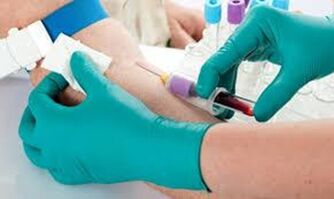Parasites living in the human body can cause the cause of unclear.It can be rash, flatulence, heartburn, nausea, weakness, anemia, joint pain.To clarify the diagnosis, special tests should be performed.
Parasites that can live in the human body

Classification of parasites in appearance:
- Lamblia,
- Opistorchi,
- echinococci,
- Poison,
- Trichinella,
- Askarids.
For representatives of certain occupations (for staff of catering companies, children's institutions), the design of hygiene books requires analysis of worm eggs.Children are admitted to kindergarten, nursery or sports departments through the same analysis.
- A classic study of worms living in the gastrointestinal tract is the analysis of feces and the mucosal scratching of the rectum.
- However, as expected and according to the method, there are several options for more effective blood tests of the parasite.
Classical study of worms
A classic study of worms living in the gastrointestinal tract (GI) tract, such as Pinworms, Ascarides, is a fecal analysis, a scratch of the mucosa by the rectum.However, a time analysis of feces may not show positive results, so three are recommended.
- To analyze feces and scratches, a histological composite map method was used (see the cutting of material under the microscope).The study efficiency is about 20%, because the probability that the egg or parasite larvae will fall into the material being analyzed is very low.
- Controversial research on worms in the body, simple parasites and fungi is the method of electroacupuncture.Their essence is to use bioelectric reaction measurements at the electrode active points to obtain results.For this purpose, special equipment is used.Many doctors believe that the research data is skeptical.
- The most useful test for parasites is blood tests.
Types of blood tests for parasites
There are several options for blood testing of parasites: according to the intent of the method.Each of these methods has its own advantages and disadvantages.Depending on the method used, the following types of blood tests exist:
- ELISA or immune plants of blood;
- PCR or polymerase chain reaction;
- hemoscaning;
- Serological blood test.
ELISA, antibody and immunosphere analysis
This analysis is based on the body's immune response, i.e. its level of protection against parasite invasion.When antibodies form a human body in response to pathogens or simply foreign body proteins in the blood, they are called immunoglobulins.
- Using the results of ELISA, you can determine the presence and type of worms in your body.The accuracy of the study is much higher than that of fecal analysis.
- The method determines their association with foreign antigens (immune responses) and human enzyme reactions based on calculations of in vivo antibodies of one or another type of parasites.
- Antibody - Antigen indicates the presence of infection.
- According to different experts, ELISA's blood tests also range from 60% to 90%, even at low levels of invasion.
- The advantages of this method besides its high accuracy, immune function analysis can be monitored by the dynamics of the disease.
IFA blood test for parasites
Analysis of antibodies looks like a set of characters that represent these antibodies, or immunoglobulins.
- A total of 5 of these have been studied-IgG, IgA, IgM, IgE IGD.
- In practical medicine, the first four immunoglobulins are important.
IgM is the main marker of acute stage of disease
IgM-immunoglobulin appears in the acute phase of the disease, indicating the onset of infection.
- Appears in the blood of the fifth day,
- It was detected by analysis after 6 weeks.
- Then he began to disappear quickly.
IGE-marking, parasitic infection indicator
IgE-immunoglobulin indicates the presence of parasites or allergies in the body.
- is a marker of allergic processes.
- It has little circulation in the blood, based on mucosa, macrophages and beetrophils,
- Immune answers involved in parasitic infections.
IgG - Signs and Immunity of Disease
IgG-immunoglobulin appears during the disease process.
- After cured, IgG also retains some infections, such as measles, rubella and other infections.
- Testing of immunoglobulin in the blood shows that the body has previously suffered from this specific pathogen.
The result elements of analysis
For different combinations of disadvantages and absences in blood tests of parasites, the following conclusions can be drawn:
- Lack of infection - all antibodies have minus;
- Acute stages -IGG(+/-), IgA(+\-), IgM(+);
- chronic form-igg(+/-), iga(-), igm(-);
- The presence of immunity (+), IgA (-), IgM (-);
- Chronic diseases - IgG (+), IgA (+), IgM (+) exacerbated
- If the disease is detected and treated, impairment of all antibodies is achieved only six months after the treatment process, sometimes 1-2 years later.
Reliability of ELISA analysis
The ELISA method gives 90% of reliability for diagnosis of ascarides, Pinworms (Enterococcus), Vitc and other diagnoses that lead to the formation of large amounts of IgG immunoglobulin.
- You can determine lamblosis by individual and general (OPD) values of antibody levels in the blood.
- The value of OPD exceeds 1, indicating an infection or
- Value is less than 0.85, no lamblia.
- If the value is in the interval, it is recommended to repeat the analysis after 2 weeks.
The method is characterized by many weaknesses.This analysis allows you to determine the levels of antibodies that neutralize the worm itself in the body.
- Therefore, it is possible to obtain false positive and false negative results.
- This also happens when patients take drugs
- The parallel existence of metabolic diseases and current chronic diseases.
General blood tests, changes in parasite infections
You can indirectly suspect the presence of an invasion by performing a general blood test.Because the presence of worms affects internal organs, the product of its important activity enters the bloodstream, changing its composition.A partial list of results that invasion affects blood parameters:
- Increased hemoglobin;
- Non-standard indicators of ESR;
- 20% excess of eosinophils;
- Zhelezia has anemia.
If there is no other reason for this bias, it is recommended to include special blood tests for parasites, ELISA, PCR in the diagnostic plan.
Polymerase chain reaction, PCR analysis
PCR method or polymer chain reaction is considered to be the basis of molecular diagnosis and is the most modern and accurate diagnosis of parasites in the body.
- It includes detecting traces of DNA and RNA that belong to parasitic life forms.
- The essence of polymerase reaction is the way blood processes it is to replicate and reproduce DNA, and the concentration of foreign organisms RNA is so that they can be determined.
Serological blood test
At the same time, analysis was used as a source of information for serum.
- Immunogenic antibodies of parasites were studied.
- This analysis allows you to identify a large number of parasitic forms, but does not allow you to determine the invasion phase.
- Like the IFA method, serological analysis is an indirect diagnosis.
- If the value of OPD is high, it is recommended to use fecal analysis separately.
Diagnosis by blood scan
When bleeding occurs on the parasite, the optical device also studies a drop of the patient's "live" blood, and in addition to the worms, you can also identify their larvae and fungi.
How to perform blood tests on parasites

The blood donation of the parasite is carried out in a specialized laboratory.The blood used for analysis was taken from the elbow vein in a quantity of 3-5 ml and placed in a dry bacteria test tube.Before passing the analysis, it is recommended:
- Don't eat for 8 hours;
- At dinner, give up fat and milk;
- Don’t drink alcohol or carbonated drinks;
- Avoid excessive physical exercise, physical therapy, radiation X-rays;
- Refuse to take medicine.
- A large number of drinks are welcome.
- The conditions for donating blood to PCR are not strict, because the degree of fullness will not affect the presence of parasite DNA.
Analysis date
- Results of IFA and serological tests are released within a week.
- For PCR blood tests and hemoscaning, a few hours are enough.
- Based on the results of the analysis, you should definitely consult a doctor.

























